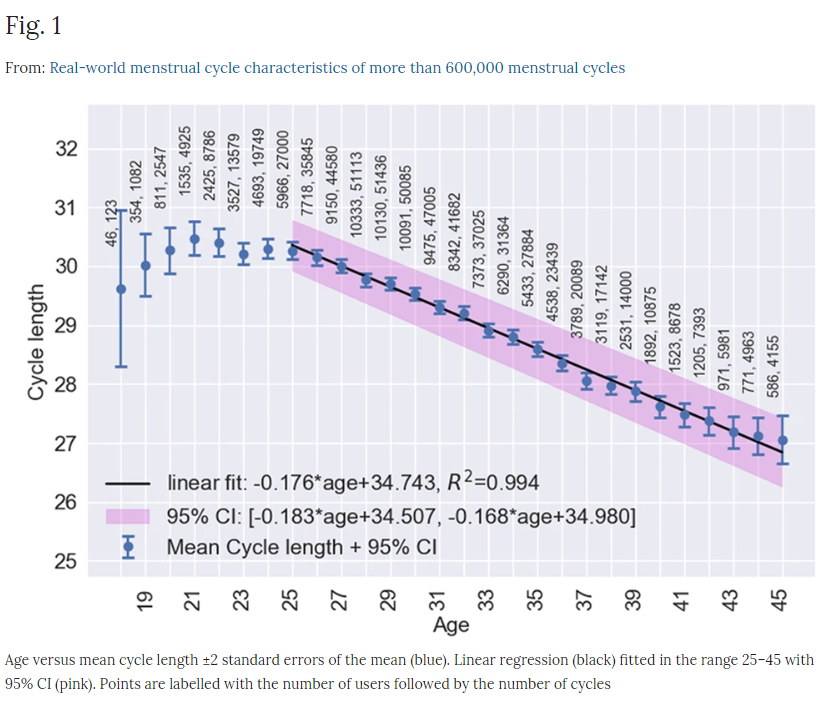The Benefits of Sharing Women's Health Data (For Research)
The popularity of health apps, particularly menstrual health apps for women, can potentially provide researchers with massive datasets from millions of women. As with all clinical research using big data, these datasets can be used to discover new insights about women's health and validate/contradict previous studies on smaller populations. Although there are downsides to data from apps (i.e. they are designed for consumers not for scientific studies) and the fact that data sharing can be abused (i.e. sharing with Facebook and not with scientists) there is a big opportunity for promoting research on women's health by using this data.
Treasure Cove vs. Obstacle for Researchers (Verge): Great overview of the pros and cons of data coming from health apps such as Fitbit, Clue, and Apple Watch for researchers. On the one hand apps (with proper privacy terms) can give researchers exposure to a huge datasets, on the other hand the data is many times self-reported and less reliable than automatic data collected in scientific studies. In addition, apps might use algorithms to clean or classify data that are not exposed to researchers (i.e. how does Fibti classify "deep sleep"), and each app might categorize data differently (i.e. sleep duration can be reported differently by two different apps). That being said, commercial companies have a lot of resources (compared to many research institutions) and the ability to store a large amount of data. Scientists such as the authors of the two research studies highlighted below, have demonstrated how despite these issues it is possible to analyze big data from women's health apps to further promomte research on women's health.
The Average Menstrual Cycle is Not Actually 28 Day (Quartz): This article discusses a study that was published in August 2019 in Nature based upon data gathered by the contraception app, Natural Cycles. The researchers (some from Natural Cycles) looked at the data of over 600,000 menstrual cycles logged by 124,648 women from Sweden, US and the UK. The study found that only 13% of cycles were 28 days and that ovulation happens on different days for each women. Insights into the personal variation in fertility and menstrual cycles demonstrates the power of big data compared to previous research on the topic that was conducted on much fewer women.
For example, take a look at cycle length broken out by age (from Jonathan Bull’s paper):
See the original full size image and paper here: https://www.nature.com/articles/s41746-019-0152-7/figures/1
Read the full paper here.
Scientist, Laura Symul, Displays Potential of Insights from Menstrual Tracking Apps (Slate): Symul is a computational biologist and is currently researching " the potential of [this] self-tracked data, recorded by millions of users around the world, to assess their usability for personalised health applications". In her recent assessment, published in Nature, she looked at data from more than 200,000 users of Kindara and Sympto (from 2.7 million logs of period cycles). She found that the data collection is of a much higher quality than might be expected ("up to 40% of the cycles in which users were seeking pregnancy had recordings every single day.") She was able to show how a digital epidemiology approach can help to lead to a better understanding of menstrual health and its connection to women’s health overall. For example, she found that that the duration of follicular phases was larger than previously reported -- only 24% of ovulations reported occurred at cycle days 14 to 15.
Period Tracker Apps Sharing Sensitive Data About Millions of Women with Facebook (CNet): In September 2019, it became public that two more period apps, MIA Fem and Maya, have been sharing highly private health data with Facebook. The apps were sharing when a women had her period, their symptoms, their use of contraception and when they last had sex. This publication comes less than a year after it was reported that Flo, one of the leading menstrual apps, was sharing highly sensitive data with Facebook. According to Privacy International, Flo is no longer sharing women's health data with Facebook, and neither are Period Tracker by Leap Fitness Group, Period Tracker by Simple Design, and Clue. Read the Privacy International report here. Incidents and companies such as those above, who are using women’s sensitive data carelessly, are a clear downside of these new datasets. With long terms & conditions, it’s hard for women to understand how exactly their data will be used, and unfortunately without any regulations or restrictions, it’s easy for health apps to take advantage and share data without research in mind.

